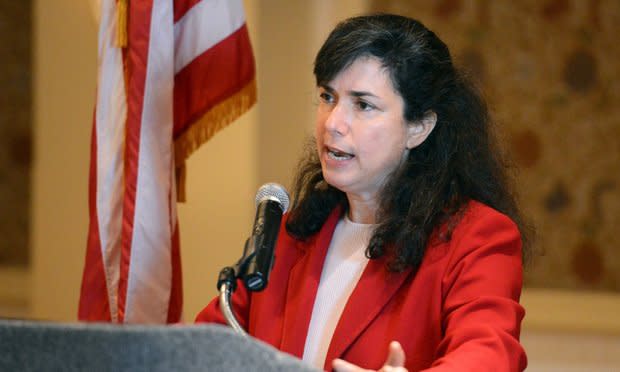Georgia Case Is Part of LGBT Workplace Bias Matter Picked Up by Supreme Court

Judge Robin Rosenbaum of the U.S. Court of Appeals for the Eleventh Circuit. Photo: Melanie Bell
A Georgia employment discrimination case from the U.S. Court of Appeals for the Eleventh Circuit is in the mix for review in the next term when the U.S. Supreme Court considers LGBT rights.
The high court agreed Monday to decide whether the nation's major workplace anti-bias law prohibits discrimination on the basis of sexual orientation and transgender status.
The cases, closely watched by employers, consumers, civil rights groups, conservative and religious organizations, will draw the high court back into the culture wars during the 2020 presidential campaign.
From the Eleventh Circuit, Bostock v. Clayton County rejected protection on a sexual preference claim, and the full court refused to review the panel decision. Circuit Judge Robin Rosenbaum filed a dissent on the issue of reconsideration, calling the case "indisputably en-banc-worthy" and noting action by other circuits.
Gerald Bostock blamed his firing as a child welfare services coordinator on a Georgia county's discovery that he was gay. The Eleventh Circuit applied its 39-year-old precedent holding "discharge for homosexuality is not prohibited by Title VII."
Brian Sutherland of Atlanta's Buckley Beal is counsel to Bostock; Clayton County is represented by Jack Hancock of Freeman Mathis & Gary.
The justices will hear arguments next term on Bostock, Altitude Express v. Zarda from the U.S. Court of Appeals for the Second Circuit and R.G. & G.R. Harris Funeral Homes v. Equal Employment Opportunity Commission from the Sixth Circuit.
At the center of each case is Title VII of the 1964 Civil Rights Act, which bars employers from discriminating because of sex, race, color, national origin or religion. The Bostock and Zarda cases ask the justices whether "because of sex" includes an individual's sexual orientation. The Second Circuit said it does; the Eleventh Circuit disagreed with that conclusion.
Altitude Express, a New York skydiving company, was accused of firing skydiving instructor Donald Zarda after he told a customer that he was gay.
In examining the text of Title VII, the Second Circuit, in a 10-3 opinion said, "The most natural reading of the statute's prohibition on discrimination 'because of … sex' is that it extends to sexual orientation discrimination because sex is necessarily a factor in sexual orientation."
Saul Zabell of Zabell & Associates in Bohemia, New York, represents Altitude Express. The Zarda estate's counsel is Gregory Antollino of New York.
In R.G. & G.R. Funeral Homes, the justices limited the petition to one question: Does Title VII prohibit discrimination on the basis of transgender status or sex stereotyping under their 1989 decision in Price Waterhouse v. Hopkins?
The Sixth Circuit answered yes to both questions. It ruled that the funeral home owners discriminated against employee Aimee Stephens by applying a dress code based on the employee's biological sex rather than gender identity. The owners fired the employee, who was born male, after the employee informed the employer of her intention to transition to female and to dress as a female.
In October 2017, while the case was on appeal, then-U.S. Attorney General Jeff Sessions issued a memorandum stating, “Title VII’s prohibition on sex discrimination encompasses discrimination between men and women but does not encompass discrimination based on gender identity per se,” and “Title VII is not properly construed to proscribe employment practices (such as sex-specific bathrooms) that take account of the sex of employees but do not impose different burdens on similarly situated members of each sex.”
The Justice Department's brief in the funeral home case lined up against the position of the EEOC. No agency lawyers appeared on the brief. The agency took the position in the lower courts that Title VII covers transgender discrimination.
The funeral home owners are represented in the high court by James Campbell of Alliance Defending Freedom. Aimee Stephens's counsel is John Knight of the American Civil Liberties Union.
Read more:
US Appeals Court Is Urged to Protect LGBT Employees Against Discrimination
Why This Quinn Emanuel Litigator Are Fighting for LGBT Workers
Justice Dept. Takes Stance Against EEOC at the US Supreme Court


